New Car Review of the 2007 Toyota Camry Hybrid Mid Size Sedan
A few years ago when I first drove a hybrid vehicle -- one that runs on a combination of gas and electric power -- I thought I was driving the car of the future.
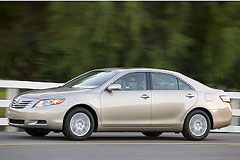
Base MSRP Range: $25,900
Base Invoice Range: $23,310
MSRP As Tested: $29,389.
Versions: Hybrid.
Vehicle Category: Mid-Size Sedan
Engine Location: Front Engine
Drive Wheels: Front-Wheel Drive.
Standard Engine as Tested: 2.4-liter, Dual Overhead Cam with VVT-i, 16-valves, I-4/Electric, 187 – horsepower at 6000 rpm and 137 lb-ft torque at 4000 rpm.
Transmission: CVT automatic.
Fuel Economy (city/hwy): 40/38
Standard Safety Features: Driver and front passenger advanced airbags, Front and rear side curtain airbags, driver and front passenger seat-mounted side airbags and driver's knee airbag, Side-impact door beams, Three-point seatbelts for all seating positions, Emergency Locking Retractors (ELR) on driver's belt, Automatic/Emergency Locking Retractors (ALR/ELR) on all passenger seatbelts; three-point front seatbelts with adjustable shoulder anchors, "> Anti-lock Brake System (ABS), Brake Assist (BA) and Electronic Brake-force Distribution (EBD), Vehicle Dynamic Integrated Management (VDIM), Child protector rear door locks, ISOFIX CRS top tether anchor brackets and ISOFIX CRS anchor attachments, Daytime running lights, Direct Tire Pressure Monitoring System, Antiskid Protection.
Competition: Acura TL, Acura TSX, Chevrolet Malibu, Chrysler Sebring, Ford Fusion, Honda Accord, Mazda 6, Nissan Altima, Volkswagen Passat.
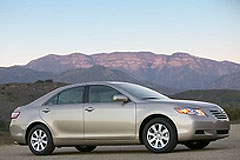
It was a car that got much better gas mileage than a conventional vehicle, or so I thought, because that's what the EPA said. And who was I to question the EPA? The environmental oracles in Washington claimed something crazy, like this hybrid could drive from Earth to Jupiter on two drops of unleaded, but the real-world mileage I got was about the same as in my 1990 Miata -- efficient, but hardly anything revolutionary.
I figured the surprising fuel usage was simply because I frequently accelerate like I'm being chased by demons and that everyone else who drove the hybrid would get a billion miles to the gallon, just like the EPA said.
Well, it turns out I wasn't the only person being duped by the EPA. The way their tests were set up greatly exaggerated the actual gas mileage drivers could expect in the real world. It was like Jayson Blair was put in charge of the cars' window stickers, scribbling ridiculously high numbers just to see how long it would take before he got caught.
While hybrid technology is getting better all the time at improving cars' efficiency and performance, I'm finding myself more disappointed with each new hybrid I drive, including the 2007 Toyota Camry Hybrid I tested last week.
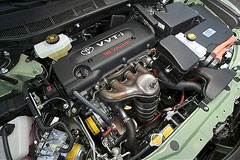
It's an amazing car by all objective standards, with excellent drivability, good performance, a quiet and comfortable ride, and impressive hybrid technology that will make your friends think you care more about Mother Earth than they do.
Yet I'm still disappointed that it can't whisk me across America powered by a single hydrocarbon molecule, as you'd expect based on the reputation hybrids have among Hollywood environmentalists.
There are two reasons for my letdown, both of which have to do with money.
The first is that hybrids are significantly more expensive than their non-hybrid counterparts -- usually by at least $2,000 -- but they don't get good enough real-world mileage to justify the added cost.
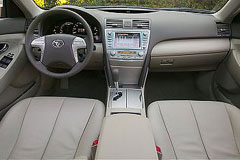
Instead of paying that $2,000 premium, you could buy 800 gallons of gas at $2.50 per gallon, enough to take you 28,000 miles in the conventional car. The hybrid would have to drive far longer than that before it saved you $2,000 worth of gasoline, making it unlikely that your fuel savings would ever justify the extra money you paid up front.
The second reason I'm leery of hybrids is that they're only sold with mid- to high-end trim packages. The base 2007 Camry, for example, costs just $18,270, but you have to pay at least $25,900 to get in a Camry Hybrid. That really stinks for people who have the most intense need to save money on gas -- those who can only afford the base Camry -- because the hybrid is only sold in a package with lots of luxuries. That's annoying.
Of course, if you want to buy a hybrid to make an environmental statement or because it produces fewer nasty emissions than a conventional car, go right ahead. You can't go wrong with a Camry Hybrid, as it's got all the sophistication and polish of the all-new Camry but with the added cool technology under the hood. It's a great car.
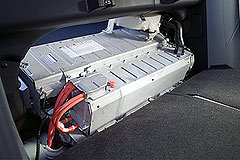
Just don't expect it to drive from Johannesburg to Cairo on a thimble full of gas.
Pros:It has all the advantages of Toyota's famous Camry -- reliability, comfort and practicality -- along with impressive hybrid technology that's good for Mother Nature. You also might qualify for a tax rebate after you buy it.
Cons:It doesn't get the kind of impressive gas mileage so many people hoped for a few years ago. Real-world mileage is definitely better than a conventional gas-powered Camry, but it may not be enough to justify the extra cost for fuel savings alone.
Ratings (1-10)
- Style: 7
- Performance: 8
- Price: 4
- Handling: 5
- Ride: 8
- Comfort: 8
- Quality: 10
- Overall: 7
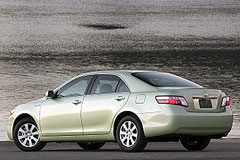
More Data
Where Built: USA
Major Options: Leather package, Convenience package. Navigation system, Power sunroof/ Power moonroof, Satellite radio, Leather upholstery, Heated front seats, Keyless access and start, Alloy wheels, Carpeted trunk.
Seating: 5.
Number of Rows: 2.
Length in Inches: 189.2
Warranties: 3-year/36,000-mile Comprehensive, 5-year/60,000-mile Powertrain, 5-year/unlimited-mileage Corrosion Perforation, 8-year/100,000-mile Hybrid-related Component Coverage, 15-year/150,000-mile Hybrid-related Component Coverage (applicable states are: CA, MA, NY, NJ, VT, CT, ME, NH and RI) with the exception of the hybrid battery. The hybrid battery is warranted for 10 years/150,000 miles.
Weight in Pounds: 3680 lbs.
Cargo Capacity in Pounds:Not Available.
Gross Maximum Vehicle Weight in Pounds: Not Available.
Towing Capacity in Pounds: 1000 lbs.
Gas Tank Capacity in Gallons: 17.2
Destination Charge: $580




